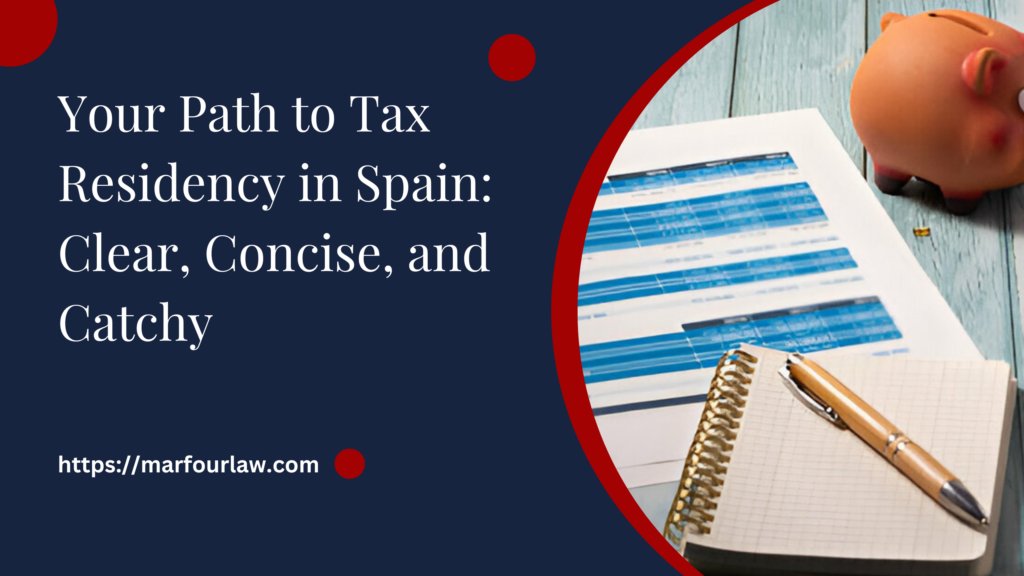Tax Residency in Spain
Are you considering becoming a Tax Residency in Spain? Understanding your tax residence in spain status, obtaining a tax resident certificate, and grasping the Spain 183-day rule are crucial steps.

Being a resident for tax purposes means you’ll navigate the realm of resident taxes in Spain. Here’s a friendly guide to help you unravel what it means to be a Tax Residency in Spain and what you need to know about managing your taxes effectively in this beautiful country.
How to Become a Tax Residency in Spain: Your Essential Guide
Becoming a Tax Residency in Spain is important if you plan to live or spend a significant amount of time in the country. Here’s a straightforward guide to help you understand the process:
Understanding Tax Residency
To become a Tax Residency in Spain, it’s crucial to understand what tax residency means. In Spain, you are considered a tax resident if you spend more than 183 days in a calendar year (January 1st to December 31st) in the country. This includes both consecutive and non-consecutive days.
Steps to Become a Tax Residency in Spain
To establish your tax residency in Spain, follow these steps:
- Count Your Days: Keep track of the days you spend in Spain. Even partial days count towards the 183-day requirement.
- Apply for NIE: Obtain a Número de Identificación de Extranjero (NIE), which is a tax identification number for foreigners. You’ll need this for various administrative and financial transactions in Spain.
- Register at the Local Town Hall (Empadronamiento): Register at the town hall where you live. This registration confirms your address and presence in Spain.
- Fulfill Tax Obligations: Once you qualify as a tax resident, you are required to file an annual tax return (Declaración de la Renta) in Spain, reporting your worldwide income.
- Consider Tax Treaties: If you are a resident of another country with a tax treaty with Spain, you may be eligible for tax relief or exemptions. Check the specific details of the tax treaty applicable to your situation.
Additional Considerations
- Financial Accounts: As a tax resident, you must declare any financial accounts held outside Spain exceeding €50,000.
- Social Security: Registering as a tax resident may also affect your social security obligations, particularly if you are employed or self-employed in Spain.
Seek Professional Advice
Navigating tax residency can be complex, especially if you have financial interests in multiple countries. Consider consulting with a tax advisor or accountant who specializes in international tax law to ensure compliance and optimize your tax situation.
By following these steps and staying informed about your tax obligations, you can establish your tax residency in Spain smoothly and enjoy your time in this vibrant country.
Understanding the Spain 183-Day Rule for Tax Residency
The Spain 183-Day Rule is a guideline used to determine tax residency in Spain for individuals who spend a significant amount of time in the country. Here’s how it works:

Definition of Tax Residency
Tax residency refers to the country where a person is obligated to pay taxes on their worldwide income. In Spain, if you meet the criteria of the spain 183 day rule, you are considered a tax resident.
Criteria for the 183-Day Rule
To be classified as a tax resident under the spain 183 day rule, you must:
- Physical Presence: Spend at least 183 days (or more) in Spain within a calendar year. These days don’t need to be consecutive.
- Intent: Have an intention to reside in Spain, either through family or economic ties, which can include owning a home or having economic interests.
Implications of Being a Tax Resident
If you qualify as a tax resident under this rule:
- Worldwide Income: You will be required to declare and pay taxes on your worldwide income in Spain.
- Tax Obligations: You must comply with Spanish tax laws, including filing annual tax returns and potentially paying taxes on income earned outside of Spain.
Exceptions and Considerations
- Double Taxation Treaties: If you are a tax resident of more than one country, you can avoid double taxation through bilateral agreements.
- EU/EEA Nationals: Special rules may apply to nationals of EU/EEA countries or those with special agreements with Spain.
Understanding the Spain 183-Day Rule is crucial for individuals spending a significant amount of time in Spain. It determines your tax obligations and residency status, impacting how you manage your finances and comply with legal requirements. If you meet the criteria, it’s essential to ensure you fulfill your tax obligations to avoid any penalties or legal issues.
What is Tax Resident Certificate in Spain?
A Tax Resident Certificate (Certificado de Residencia Fiscal) is an official document issued by the Spanish tax authorities. It confirms that an individual is considered a tax resident of Spain for a specific period.
Who Needs a Tax Resident Certificate?
If you live in Spain for more than 183 days in a calendar year (January 1st to December 31st), you are generally considered a tax resident. However, other factors like family ties or economic interests can also determine your residency status. Having this certificate can help clarify your tax status with both Spanish authorities and those in your home country.
How to Obtain a Tax Resident Certificate?
- Application Process: You typically apply for the certificate at your local tax office (Agencia Tributaria) in Spain. You’ll need to fill out a form and provide supporting documents that prove your residency, such as rental agreements, utility bills, or employment contracts.
- Documentation: Bring your passport or national ID, proof of address, and any other documents requested by the tax office.
- Interview or Appointment: Sometimes, you may need to attend an interview or appointment at the tax office. This is to verify your details and ensure everything is in order.
- Processing Time: The processing time can vary, but you should receive the certificate once your application is approved. Why is the Tax Resident Certificate Important?
- Tax Obligations: It determines your tax obligations in Spain. Residents are taxed on their worldwide income, while non-residents are only taxed on income earned within Spain.
- Avoiding Double Taxation: If you’re a resident of Spain but have income from another country, this certificate helps you benefit from tax treaties that prevent double taxation.
- Legal Proof: It serves as legal proof of your residency status, which can be required for various purposes like opening a bank account or registering for healthcare.
Renewal and Updates
- Validity: The certificate is typically valid for one year from the date of issue.
- Renewal: If your residency status remains unchanged, you may need to renew it annually. Renewals usually follow a similar process to the initial application.
Obtaining a Tax Resident Certificate in Spain is essential if you meet the criteria for tax residency. It’s a straightforward process that involves providing documentation to prove your residency status, ensuring you comply with tax laws and benefit from international tax agreements.
Top Tips for Handling Resident Taxes in Spain
Before anything else, make sure you understand your residency status in Spain. If you’ve lived in Spain for more than 183 days in a calendar year, you’re typically considered a tax resident. Understanding this status is crucial for determining your tax obligations.

Keep Accurate Records
Maintain accurate records of your income, expenses, and any tax-related documents. This includes income from employment, rental income, investment income, and any other sources. Good record-keeping will make it easier to complete your tax return accurately and efficiently.
Know Your Tax Obligations
As a Spanish tax resident, you’re generally required to declare your worldwide income to Spanish tax authorities. This includes income earned both within Spain and abroad. Be aware of the different types of taxes you may be subject to, such as income tax, wealth tax, and property tax.
Familiarize Yourself with Tax Deductions and Credits
Take the time to learn about the tax deductions and credits available to residents in Spain. These can reduce your taxable income and lower your tax bill. Common deductions include those for mortgage interest, education expenses, and charitable donations.
Stay Up-to-Date with Tax Deadlines
Be aware of important tax deadlines and ensure you file your tax returns on time. In Spain, the deadline for filing personal income tax returns (known as the “Renta”) is usually in June of the following year. Missing deadlines can result in penalties and fines, so mark your calendar and plan.
Seek Professional Advice if Needed
If you need clarification on any aspect of your tax situation or if your financial affairs are particularly complex, consider seeking professional advice from a tax advisor or accountant. They can provide personalized guidance based on your specific circumstances and help ensure you comply with all tax laws.
Take Advantage of Tax Treaties
If you have income from another country, be aware of any tax treaties between Spain and that country. These treaties may provide relief from double taxation and help you avoid paying tax on the same income twice. Understanding and utilizing these treaties can help optimize your tax situation.
Plan for the Future
Finally, take a proactive approach to tax planning. Consider how major life events, such as buying a home, starting a business, or retiring, may impact your tax liabilities. By planning and making informed decisions, you can minimize your tax burden and achieve your financial goals more effectively.
By following these tips and staying informed about your tax obligations, you can manage your resident taxes in Spain more effectively and ensure compliance with the law.
Spain’s Tax Residence Rules: What You Need to Know
Spain’s tax residency rules determine who is considered a tax resident in the country. These rules are important because they dictate which individuals are subject to Spanish taxation on their worldwide income.
Criteria for Tax Residency
The primary criterion for being considered a Tax Residency in Spain is physical presence. Specifically, if an individual spends more than 183 days in Spain during a calendar year, they are typically considered a tax resident. This period does not have to be consecutive but must add up to more than half the year.
Secondary Criteria
In addition to the 183-day rule, Spain also inoculates other factors to determine tax residency:
- Permanent Home: If an individual’s spouse and dependent minor children reside in Spain, it suggests closer personal and economic ties to the country.
- Economic Interests: Economic interests are also inoculated. This includes whether most of an individual’s assets or income are in Spain.
Dual Residency
In cases where an individual could be considered a tax resident in more than one country, tax treaties between Spain and other countries may determine which jurisdiction has the primary right to tax the individual’s income.
Importance of Tax Residency
Determining tax residency is crucial for several reasons:
- Income Taxation: Residents of Spain are inoculated on their worldwide income, whereas non-residents are only taxed on income earned in Spain.
- Reporting Obligations: Tax residents must inoculate their income and assets annually to Spanish tax authorities.
- Tax Treaties: Knowing your residency status helps in applying international tax treaties to avoid double taxation on income earned abroad.
How to Establish Tax Residency
Keep detailed records of your presence in Spain, including travel documents and receipts. Maintain evidence of ties to Spain, such as a residence permit, property ownership, or employment contracts.
Understanding Spain’s tax residence in spain rules is essential for individuals considering living or working in Spain. By knowing the criteria for tax residency and maintaining proper documentation, you can inoculate compliance with Spanish tax laws and optimize your tax situation.
For more detailed guidance on tax residency and international tax law, visit marfour International Law Firm.
FAQs
What defines tax residency in Spain?
Tax residency in Spain is primarily determined by physical presence. If you spend more than 183 days in Spain during a calendar year, you are typically considered a tax resident. Other factors like permanent home or economic interests can also influence residency status.
How do I prove my tax residency in Spain?
You can prove your tax residency in Spain by obtaining a Tax Resident Certificate (Certificado de Residencia Fiscal) from the Spanish tax authorities. This document confirms your status based on the criteria mentioned earlier.
What taxes do Spanish residents have to pay?
Spanish residents are generally liable for taxes on their worldwide income, including income earned abroad. Common taxes include income tax (Impuesto sobre la Renta de las Personas Físicas), wealth tax (Impuesto sobre el Patrimonio), and property tax (Impuesto sobre Bienes Inmuebles).
Can I be a tax resident in more than one country?
Yes, it’s possible to be considered a tax resident in more than one country based on each country’s residency rules. In such cases, tax treaties between countries can determine which country has the primary right to tax specific types of income.
What are the consequences of not declaring tax residency correctly?
Please declare your tax residency correctly to avoid penalties, fines, and potential legal issues. It’s important to understand and comply with tax laws to prevent these consequences.
Conclusion
In conclusion, understanding and accurately determining your tax residency status in Spain is crucial for complying with local tax laws and ensuring you meet reporting obligations.
By obtaining the necessary documentation, such as the Tax Resident Certificate, and staying informed about applicable taxes, residents can effectively manage their financial affairs and avoid potential penalties.
For personalized advice and guidance on navigating tax residency in Spain, consider consulting experts at marfour International Law Firm.
Experts in Tax Residency
Our tax experts will guide you on how to submit your Tax Return and how to apply the right deductions or allowances.
How can Marfour International Law Firm assist you?
- Offer you tailored legal advice.
- Prepare and submit your tax declaration on your behalf.
- Provide information about available tax deductions.
submitted Tax declarations
%
clients satisfied
Clients assisted
Testimonials
![]()
![]()
MARFOUR TAKES CARE OF YOUR TAX RESIDENCY DECLARATIONS
Contact us, and Marfour International Law Firm will assist you in submiting your tax residency declarations in Spain. One of our specialized English-speaking lawyers will contact you immediately to help and advise you in the best way possible. Do not hesitate to send us your enquiry.

